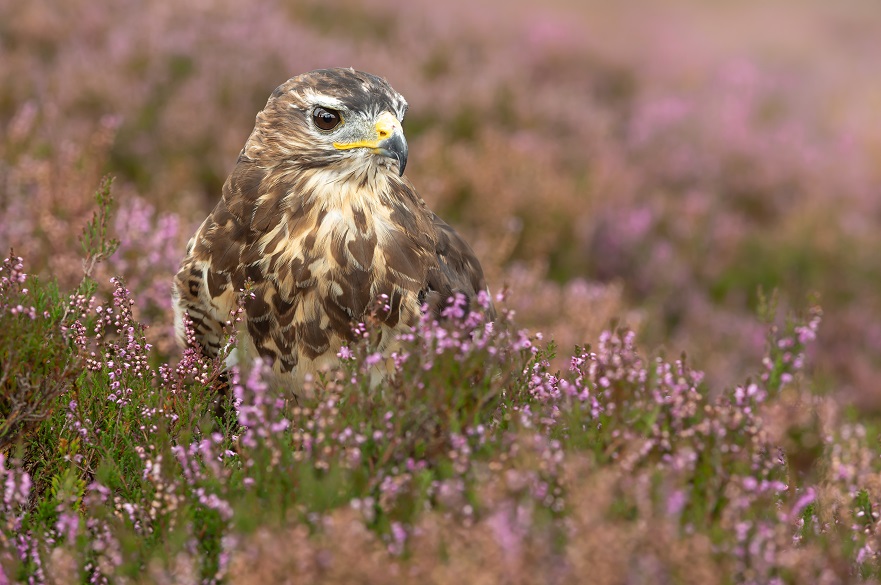Animals at risk as wildlife crime falls down the list of policing priorities
Despite being one of the highest value areas of crime globally, with links to organised and violent crime, wildlife crime is falling down the list of policing priorities due to lack of data, resource, and expertise, according to research led by Nottingham Trent University (NTU).
By Helen Breese | Published on 11 May 2023
Categories: Press office; Research; School of Social Sciences;

The study, commissioned by the International Fund for Animal Welfare (IFAW), examines the current state of wildlife crime in the UK and its enforcement. It forms the basis of a major new Make wildlife matter report and campaign from IFAW, which aims to galvanise the public, politicians, and organisations to press the government to better protect precious wildlife.
Wildlife crime – which increased by an estimated 30% between 2019 and 2021 - is broadly defined as the illegal exploitation of wildlife species, including poaching, such as illegal hunting, fishing, killing, or capturing; abuse; and/or trafficking of wild animal species. Interpol and the United Nations Environment Programme estimate that natural resources worth as much as USD 91 billion to USD 258 billion annually are being stolen by criminals.
Researchers from NTU and the University of Gloucester carried out surveys with police forces and Police and Crime Commissioners in both 2015 and 2022. They also conducted interviews with a range of Non-Governmental Organisations (NGOs) and academics with expertise in wildlife crime and wildlife law. In addition, the team analysed literature on wildlife crime and wildlife law in the UK.
Findings showed that wildlife crime is not currently considered a core policing issue and is not given the same priority as ‘mainstream’ crimes. This is despite 100% of the wildlife crime officers questioned stating that wildlife offending was linked to other forms of serious crime, and 89% saying that wildlife crime should be given the same priority as more traditional types of crime.
Wildlife crimes were often seen as being victimless and therefore considered lesser offences. It is suggested that this lack of a human victim leads to under reporting and a perception of less threat, harm, and risk.

Dr Angus Nurse, Head of Criminology, NTU School of Social Sciences
In the UK, notifiable offences are serious crimes that are reported to the Home Office by the Police for statistical purposes, and only a small amount of serious wildlife crimes are notifiable.
This was seen as an issue by all of the enforcement officers who completed questionnaires, as it means the lesser status in legislation impacts on the priority afforded to wildlife crime and its recording. This contributes to a lack of clear data on the level of wildlife crimes, as recording is inconsistent and varies by location, making it difficult to identify where priorities should lie.
The research also identifies wildlife crime as an under-resourced area that is heavily reliant on the dedication of individual officers and support from NGOs, such as the RSPB, RSPCA, and the League Against Cruel Sports. Cuts in policing budgets due to austerity measures are also impacting on the effectiveness of wildlife policing.
Participants raised concerns about the lack of available expertise in some areas, particularly when prosecutors with expert knowledge and experienced wildlife crime officers move to other roles with no guarantee that the specialist resource will be retained.
While the role of wildlife crime officer is recognised as an integral part of the policing response to wildlife crime, participants identified issues with training and the extent to which these officers are able to dedicate themselves to this enforcement given other demands.
Dr Angus Nurse, research lead and Head of Criminology at NTU’s School of Social Sciences, said: “It’s clear that enforcement response is variable, indeed our Police and Crime Commissioner respondents indicated a clear belief that some police forces investigate and respond to wildlife crimes better than others.
“Our respondents pointed to some inconsistency in the understanding of wildlife crimes and wildlife and a greater need for training and resources to support effective investigation and prosecution. As a result, we found that effective wildlife crime enforcement is heavily dependent on the enthusiasm, dedication and specialist knowledge of individual officers and prosecutors rather than there being a clear, coordinated, effective permanent system in place across the UK.”
Based on the research findings, the IFAW report calls for a number of changes to policy and law, including making wildlife crimes notifiable; harmonising, simplifying, and streamlining all UK wildlife law; ensuring that there is at least one dedicated full-time wildlife crime officer per force; incorporating wildlife crime into the Policing Education Qualification Framework; and developing enforcement, prosecution, and sentencing guidelines to combat inconsistencies around wildlife crime scenarios and how those should be dealt with.
Frances Goodrum, Head of Campaigns, IFAW UK, said “Wildlife in the UK is already in crisis—being pushed to the brink through habitat loss, climate change and pollution. But these alarming findings show that criminals are purposefully going out of their way to harm or make profit from them.
“The fact that wildlife crime cannot be reported as a crime in a meaningful way means the government cannot measure or manage the current situation. Countless sinister crimes could be being committed—we simply do not know—it is all very ‘finger in the air’. This must change – our wildlife deserves better.”
Notes for Editors
Press enquiries please contact Helen Breese, Public Relations Manager, on telephone +44 (0)115 848 8751, or via email.
About Nottingham Trent University
Nottingham Trent University (NTU) received the Queen’s Anniversary Prize for Higher and Further Education in 2021 for cultural heritage science research. It is the second time that NTU has been bestowed the honour of receiving a Queen’s Anniversary Prize for its research, the first being in 2015 for leading-edge research on the safety and security of global citizens.
The Research Excellence Framework (2021) classed 83% of NTU’s research activity as either world-leading or internationally excellent. 86% of NTU’s research impact was assessed to be either world-leading or internationally excellent.
NTU was awarded The Times and The Sunday Times Modern University of the Year 2023 and ranked University of the Year in the Whatuni Student Choice Awards 2023. It was awarded Outstanding Support for Students 2020 (Times Higher Education Awards), University of the Year 2019 (Guardian University Awards, UK Social Mobility Awards), Modern University of the Year 2018 (Times and Sunday Times Good University Guide) and University of the Year 2017 (Times Higher Education Awards).
NTU is the 5th largest UK institution by student numbers, with approximately 40,000 students and more than 4,400 staff located across five campuses. It has an international student population of 7,000 and an NTU community representing over 160 countries.
Since 2000, NTU has invested £570 million in tools, technology, buildings and facilities.
NTU is in the UK’s top 10 for number of applications and ranked first for accepted offers (2021 UCAS UG acceptance data). It is also among the UK’s top five recruiters of students from disadvantaged backgrounds and was the first UK university to sign the Social Mobility Pledge.
NTU is ranked the second most sustainable university in the world in the 2022 UI Green Metric University World Rankings (out of more than 900 participating universities).